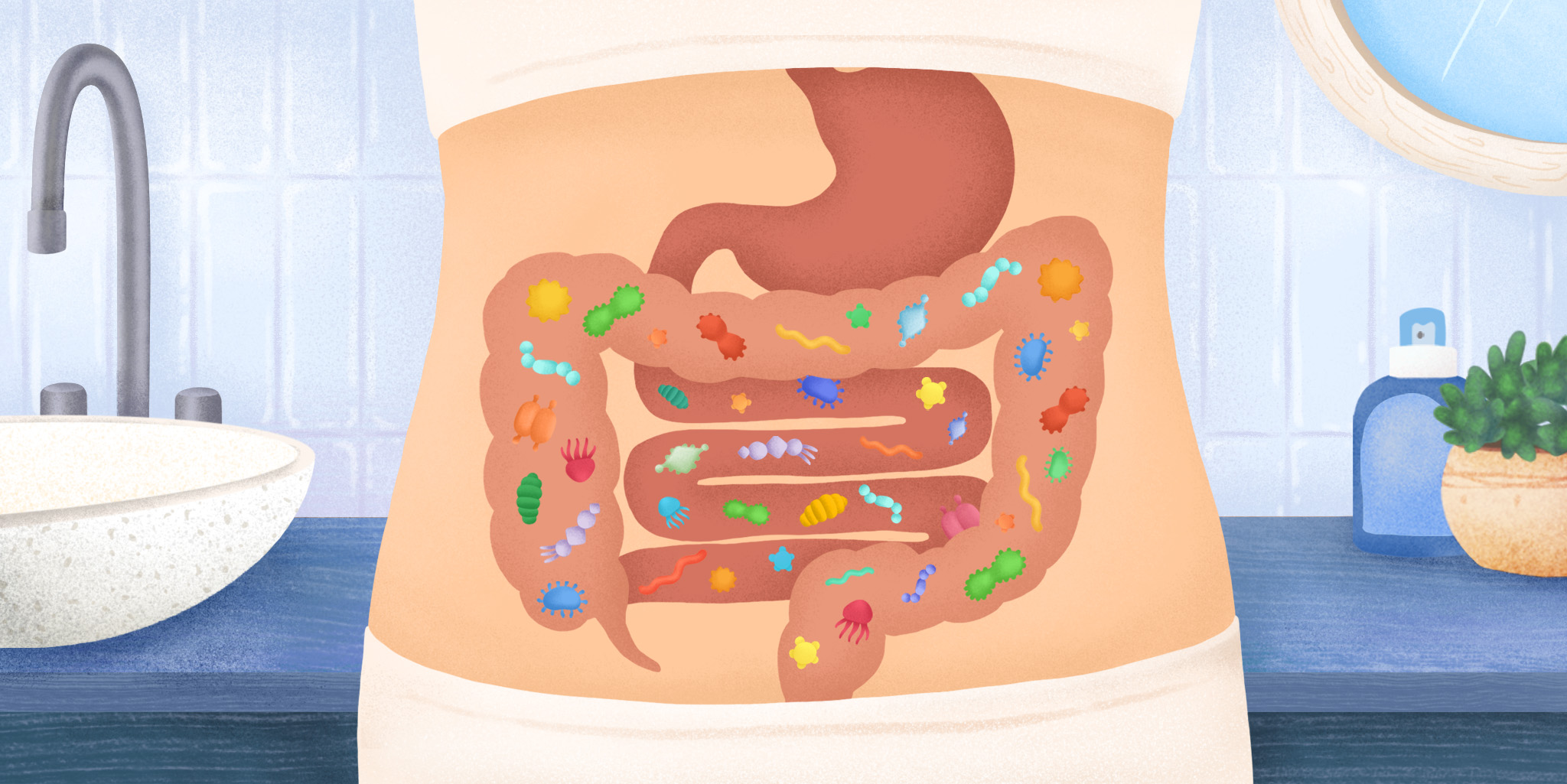
Inside your gut lies an unexpected world, teeming with microorganisms. This tiny universe, invisible to our eyes, plays an immense role in our health. In this article, we explain what the microbiota really is and why it deserves your full attention.
What is the microbiota?
Imagine your body as a vast galaxy housing billions of microorganisms: bacteria, viruses, fungi… These tiny inhabitants, invisible to the naked eye, form well-organized communities called microbiota, which are found in various parts of the body: nose, mouth, genital organs, skin, but most importantly… in our gut! If all of them were gathered together and weighed, they could total up to 2 kg (4.4 pounds)1!
In this article, we will focus on the gut microbiota, a true cornerstone of our health. Did you know that 70 to 80% of the bacteria in our body live in the gut? They include hundreds of different species and play such essential roles2.
Bacteria: friend or foe?
The word “bacteria” often has a bad reputation. However, not all bacteria are “bad”! Our body also hosts many beneficial bacteria that support our health. Each one has its own specificity, and the more diverse they are, the better they collaborate to protect us and maintain our body’s balance.
Why is balance so important?
A healthy microbiota is characterized by a wide variety and abundance of good bacteria. This balance is crucial to prevent ‘dysbiosis,’ an imbalance that occurs when good bacteria are depleted, harmful bacteria proliferate, or microbial diversity decreases. An imbalanced microbiota can have significant consequences on our health.
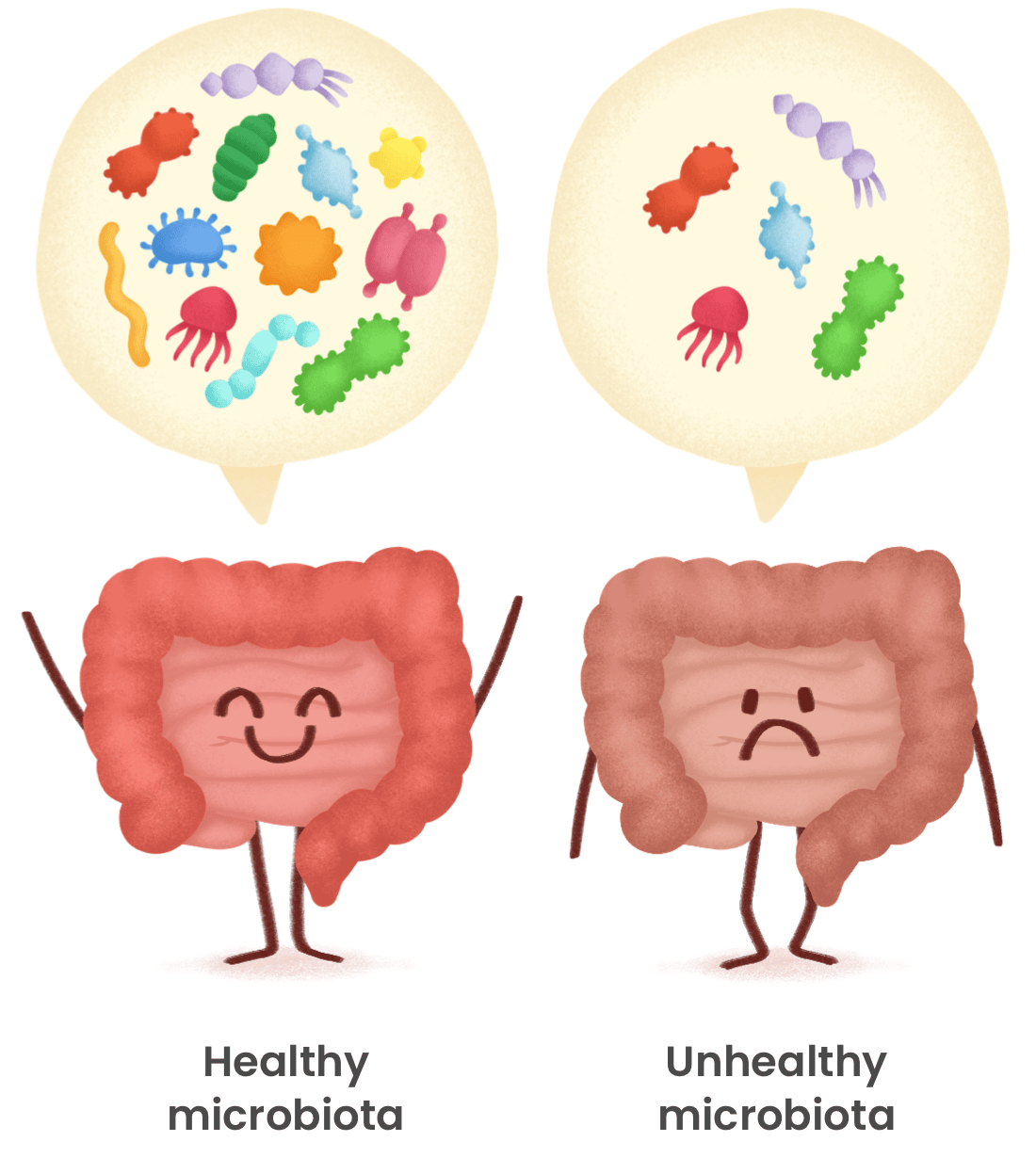
Our microbiota is threatened by our lifestyle
Unfortunately, our modern lifestyle disrupts the balance of our microbiota, making it more prone to dysbiosis. Just like the planet’s biodiversity is at risk, the diversity of our gut bacteria is also under threat. The more industrialized a society is, the less diverse its microbiota tends to be.
The main contributing factors?
- Highly processed foods that are low in fiber but packed with sugars and all kinds of additives
- Excessive hygiene, limiting natural exposure to microorganisms
- Frequent and sometimes excessive use of antibiotics, which wipe out both harmful and beneficial bacteria3.
The consequences are far from minor. When the diversity of our microbiota decreases or becomes imbalanced, it can trigger various digestive issues (constipation, diarrhea, abdominal pain, bloating) and, over time, raise the risk of serious chronic conditions like diabetes, obesity, autoimmune diseases, cardiovascular problems, and even certain neuropsychiatric disorders4-8.
How is the microbiota formed?
It all begins at birth!
The story of our bacteria starts as soon as we enter the world. Before birth, a baby’s digestive tract is sterile, meaning it contains no microorganisms. During vaginal delivery, as the baby passes through the birth canal, they acquire their first “batch” of bacteria, primarily from the mother’s vaginal and fecal microbiota. In the case of a cesarean section, the baby’s microbiota is different: it is more colonized by bacteria from the hospital environment, the mother’s skin, and later from the father’s skin during skin-to-skin contact. This first exposure to bacteria is crucial because the first arrivals have the advantage over others: they settle in the best spots in the intestine. In other words, it’s a “first come, first served” rule 😉10.
Until the age of 3 to 5 years, the microbiota continues to evolve and diversify, influenced by various factors such as food intake, hygiene, medications, environment, and even genetics. Among these factors, breastfeeding, followed by the introduction of solid foods, plays a key role. Exposure to the environment—such as where we live, whether in the countryside or the city, or even contact with animals—also contributes to enriching and shaping the microbiota, which ultimately becomes unique to each individual11.
The key role of diet and lifestyle
Just like fingerprints, the gut microbiota is unique to every individual. However, it is not permanent: less than 10% of our microbiota is influenced by our genetics, while the rest can evolve depending on external factors. It’s a dynamic ecosystem.
A recent study reveals a surprising fact: people living in the same house, even if they’re not related, share a more similar microbiota than family members living apart12. This demonstrates that our diet and lifestyle have more influence than our genetic heritage! And that’s excellent news, as it means we have the power to directly impact our microbiota. Within just 24 hours, changes in dietary habits can begin to alter its composition13.
The superpowers of the microbiota
Although invisible to our eyes, the tiny organisms inhabiting our gut possess superpowers far beyond their size. Let’s explore the main benefits of these microscopic allies!
Production of really useful molecules
Our gut bacteria can produce essential vitamins for the body, such as B vitamins, which boost energy, and vitamin K, which is crucial for wound healing14.
The microbiota can also create remarkable small molecules called short-chain fatty acids (SCFAs) from the fiber of our diet. These SCFAs are true multitasking molecules15:
- They make the intestine slightly acidic, which slows the growth of harmful bacteria.
- They provide energy to intestinal cells, helping them regenerate quickly.
- They strengthen the intestinal lining, our protective barrier that prevents bacteria, toxins, and allergens from entering the bloodstream—a true defensive wall!
A guardian of our immune system
The gut microbiota acts as a natural shield, protecting our body through several mechanisms16:
- Physical barrier: The large number of beneficial bacteria forms a protective layer. Imagine an army of good bacteria lined up like a strong wall to defend our body—that’s our microbiota watching over us!
- Competition: When beneficial bacteria are abundant, they deprive harmful bacteria of nutrients, limiting their growth.
- Production of natural antibiotics: Our good bacteria produce “natural antibiotics” that inhibit the growth of harmful bacteria.
But that’s not all! The microbiota also regulates our immune system, helping our white blood cells identify real threats, like certain viruses and harmful bacteria. This allows the immune system to focus its defenses on actual intruders, avoiding attacks on good bacteria or, worse, our own cells17!
A regulator of weight and metabolism
The gut microbiota influences how we store fat and gain weight. This might partly explain why some people are more susceptible to weight gain than others, even with similar eating habits18,19.
Moreover, the microbiota affects our appetite and satiety. Depending on its composition, it can even influence cravings for fatty or sugary foods!
A key player in mental health
The microbiota plays a crucial role in communication between the gut and the brain, notably through the production of neurotransmitters (chemical messengers)20,21. Did you know that 95% of serotonin, often called the “happiness hormone,” is produced in the gut thanks to the microbiota?
The gut microbiota and the brain maintain a constant dialogue, often referred to as the gut-brain axis. This connection is tangible: who hasn’t experienced a stomachache before a stressful event? But this dialogue goes far beyond fleeting emotions—it influences our mood, stress levels, and may even play a role in complex disorders such as anxiety or depression22,23. Maintaining a balanced microbiota is therefore essential for our mental health.
Star foods for a healthy microbiota
Taking care of your microbiota starts on your plate. This precious ecosystem thrives on whole foods and fermented foods. Here are the must-haves to include in your daily diet!
 | Fiber |
Dietary fiber is essential for your gut’s microbiota health. Yet, most of us consume far too little! In France, 89% of adults fail to meet the 25 g/day recommended by the WHO, and in the United States, this figure rises to 95%24-26. However, getting enough fiber helps reduce the risk of strokes and diabetes27.
Why is fiber so important? Since fiber isn’t digested by the stomach or small intestine, it makes its way to the colon intact, where it becomes a favorite food for gut bacteria. These bacteria ferment the fiber, producing short-chain fatty acids (SCFAs) that offer incredible health benefits.
Here are some foods to prioritize28:
| 🥕 Vegetables | Garlic, artichokes, asparagus, beetroot, broccoli, carrots, chestnuts, endive, cabbage, fennel, green peas, corn, onions, parsnips, leeks, sunchokes |
| 🌿 Legumes | Beans, lentils, peas, fava beans, chickpeas |
| 🍎 Fruits | Avocado, bananas (not too ripe), dates, figs, kiwi, apples, nectarines, peaches, pears, prunes |
| 🌰 Nuts | Almonds, peanuts, walnuts, hazelnuts, pistachios |
| 🌻 Seeds | Chia, flaxseed, sunflower seeds, pumpkin seeds, sesame seeds |
| 🌾 Grains and starchy foods | Oats, whole wheat, millet, barley, cooled potatoes, quinoa, brown rice, rye, buckwheat |
Tips to boost fiber intake:
- Opt for whole fruits and vegetables. You can also eat the skin, as it often contains a lot of fiber—just make sure to opt for organic produce, since the skin can also concentrate pesticides.
- Limit fruit juices, which are low in fiber and normally high in sugar.
- Choose high-fiber grains like brown rice, buckwheat, oats, or quinoa, as they contain more fiber. Ideally, go for organic options, since the fiber is mostly in the outer layer of the grain, which also tends to concentrate pesticides.
- Add legumes to your meals at least twice a week29: chickpeas, beans, lentils, fava beans – To make them easier to digest, soak them in water overnight before cooking, then rinse them 2 to 3 times.
- Use less refined flours and opt for whole grain or ancient varieties like spelt or rye.
- Consume cold starches (like rice or potato salads). When cooled, they contain more resistant starch, a type of fiber that nourishes good gut bacteria30.
- Sprinkle seeds on your meals: on salads, yogurt, or baked goods. Remember to soak flax and chia seeds in liquid before consuming them, as they are great for supporting transit!
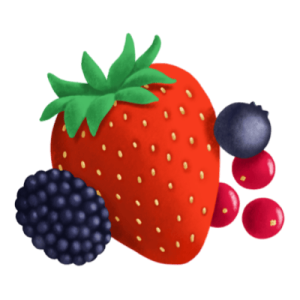 | Polyphenols |
Polyphenols are natural compounds plants produce to defend themselves against external stressors like insects, mold, or UV rays. And what protects plants can also protect… your microbiota! These compounds stimulate the good bacteria in your gut and boost microbiota diversity31.
The richest food in polyphenols include red fruits (blackcurrants, blueberries, raspberries), artichokes, coffee, dark chocolate (at least 70% of cocoa), black and green tea, and spices like turmeric, cloves, and anise32,33. By eating these foods regularly, you give your microbiota a real boost!
 | Organic Products |
It’s better to choose organic fruits and vegetables, as they contain on average 20 to 70% more polyphenols than conventional ones34. Eating organic food also helps you avoid exposure to chemical pesticides, which can weaken or kill certain bacteria in the microbiota. A double benefit!
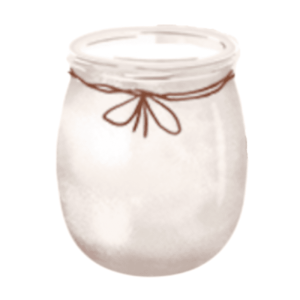 | Fermented Foods |
Fermented foods, such as yogurt, certain cheeses (especially those made with raw milk)35, kombucha, kefir, miso, tempeh, and lacto-fermented vegetables (like kimchi and sauerkraut), are a true treasure for your microbiota. These foods are packed with live beneficial bacteria that support the diversity and balance of the microbiota. They can be considered natural probiotics, contributing to both digestive and overall health36-38.
To fully benefit from their effects, it’s essential to consume these foods raw or unpasteurized, as heat destroys the live bacteria.
The enemies of a healthy microbiota
Now that we know why and how to take care of our gut microbiota, let’s review its worst enemies.
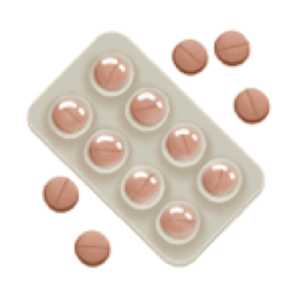 | Antibiotics |
Antibiotics are designed to eliminate bacteria responsible for infections, but their mode of action is non-selective: they also destroy many beneficial bacteria of the microbiota. Like a bomb, the explosion will eliminate harmful bacteria but also causes collateral damage by killing “friendly” bacteria.
This phenomenon can have significant consequences, especially for children under three years old, whose microbiota is still developing. At this age, disrupting this delicate ecosystem can increase the risk of long-term health problems, such as asthma, food allergies39, diabetes, obesity40, and chronic inflammatory bowel disease41. In cancer patients, studies suggest that antibiotics may even reduce the effectiveness of chemotherapy and immunotherapy42.
While antibiotics are indispensable in certain situations, particularly for bacterial infections, it’s crucial to use them only when necessary, follow your doctor’s advice, and avoid self-medication.
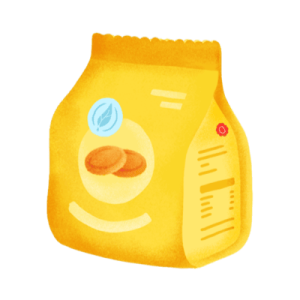 | Ultra-processed foods |
Packed with added sugars, saturated fats, and various additives, ultra-processed industrial foods can disrupt the microbiota.
Research indicates that certain food additives, such as emulsifiers, sweeteners, and colorings, can deplete and destabilize the gut microbiota while weakening the intestinal barrier. When this protective barrier becomes more permeable, harmful substances can enter the body, triggering a “silent” yet persistent inflammation.
Over time, this chronic inflammation can weaken the body and increase the risk of developing chronic conditions, such as allergies, certain autoimmune diseases (like Crohn’s disease), or even some cancers43-49.
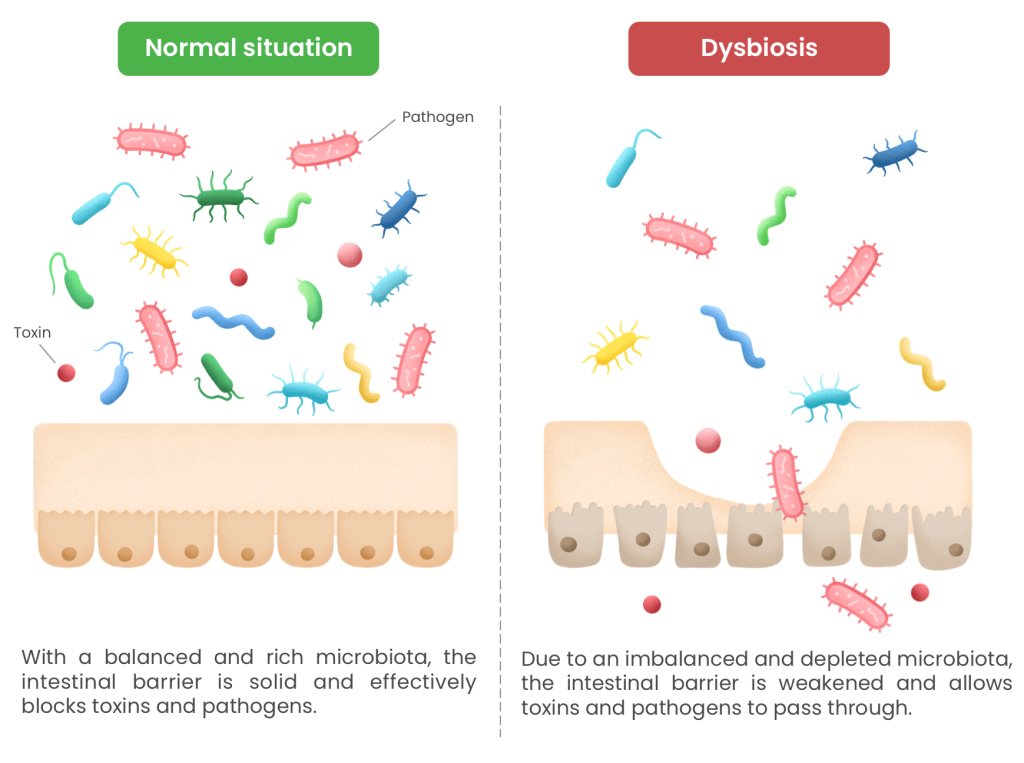
 | Lack of physical activity |
Spending too much time inactive can harm the microbiota, reducing its diversity and weakening the intestinal barrier, which allows undesirable substances to pass through50.
On the other hand, physical activity enhances microbial richness and diversity, boosting the production of SCFAs (short-chain fatty acids)—valuable multitasking molecules51,52. It’s a win-win relationship: physical activity stimulates the microbiota, which in turn produces substances that increase our energy and physical performance, encouraging us to move even more53,54.
No need to run a marathon—the key is to stay active every day with simple, regular activities!
 | Chronic stress |
Prolonged stress disrupts the microbiota by increasing the production of cortisol, a hormone that promotes inflammation and destabilizes the gut. Additionally, stress often intensifies cravings for sugary or fatty foods, which feed “bad” bacteria and exacerbate inflammation. This can create a vicious cycle: the more we are stressed, the more we tend to adopt poor eating habits, and the more inflammation increases, further aggravating the situation55.
To break this cycle, it’s essential to take time each day to relax—whether through meditation, a walk in nature, or simply by a few minutes of deep breathing.
 | Excessive hygiene |
In the pursuit of disinfecting and sterilizing everything, we risk weakening our microbiota and especially for children, whose microbiota and immune systems are still in development. Overprotecting them from environmental microbes restricts their microbiota and their immune system from learning to differentiate between beneficial and harmful bacteria, leaving them more vulnerable later on.
A little bit of contact with germs is actually beneficial, as it helps the body learn how to make the difference between bad and good bacteria. Studies show that in populations with less strict hygiene practices, microbiota diversity tends to be higher—a key factor for better overall health56 !
Of course, maintaining hygiene is important, but it’s important not to become overly obsessive about it.
 | Not enough sleep |
A lack of sleep or an irregular sleep schedule can disrupt the balance of our microbiota. Just as our bodies are designed to be active during the day and rest at night, the microbiota is the same. Our microbiota loves regularity!
Even a slight disruption to this rhythm—such as staying up too late or getting too little sleep—can lead to an imbalance in the microbiota. Over time, this imbalance may contribute to the development of various chronic diseases57.
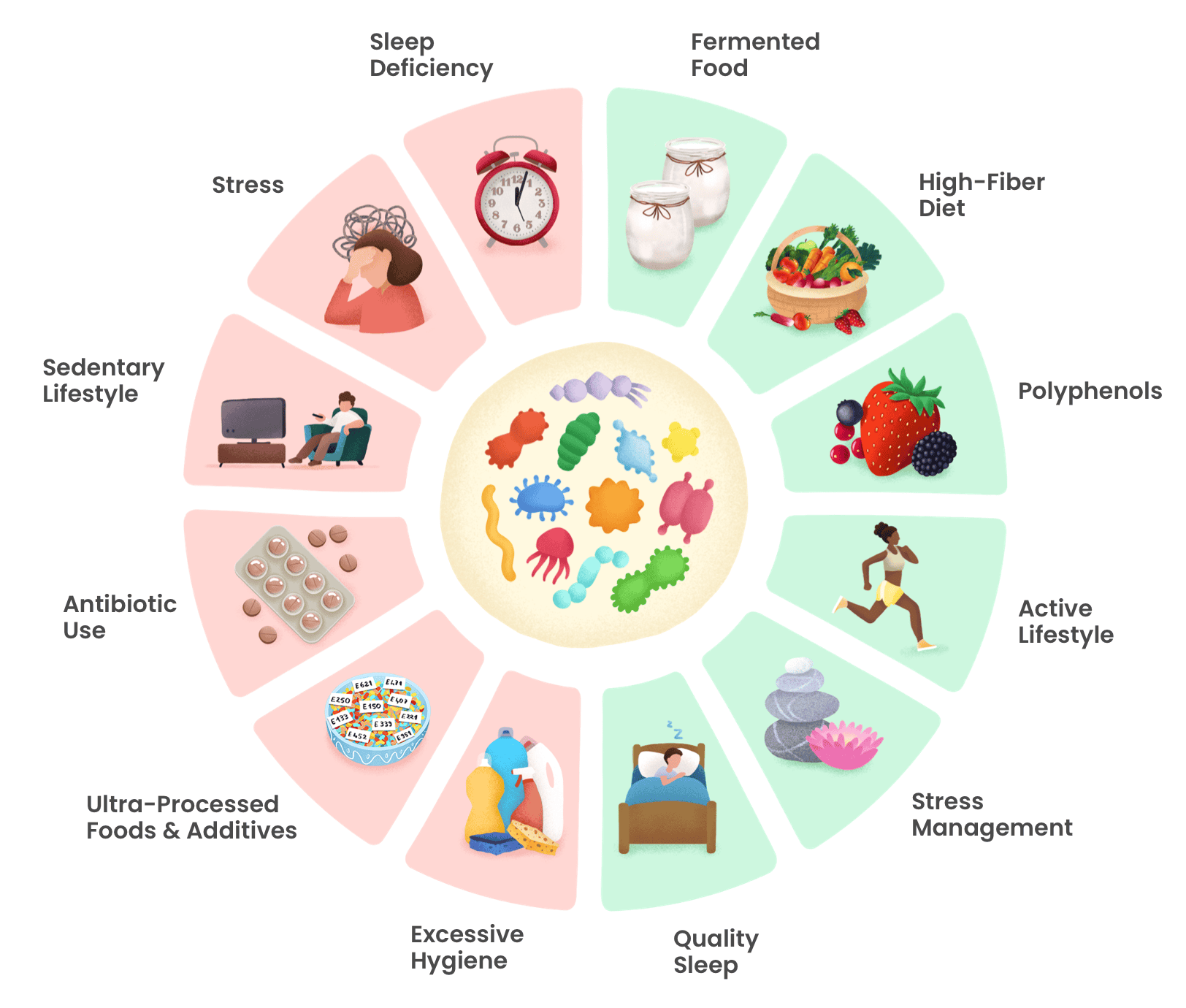
In summary: 10 keys to a healthy microbiota
Now that you understand the importance of the microbiota for our health, here are 10 essential tips to remember:
 | Let children explore their environment Encourage them to spend time outdoors, interacting with nature and animals. A little bit of "dirt" helps their bodies prepare better for real threats. |
 | Limit antibiotics Use them only with a doctor’s prescription and avoid their use as much as possible in young children with fragile microbiota. |
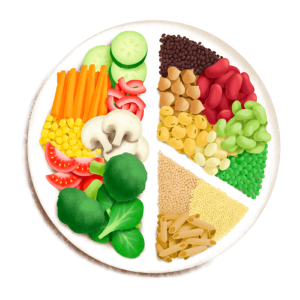 | Diversify your diet Eat a wide variety of foods rich in fiber and polyphenols (fruits, vegetables, legumes), and include fermented foods. |
 | Opt for less processed foods as possible Avoid ultra-processed foods and opt for homemade meals made with raw, organic, and seasonal ingredients. |
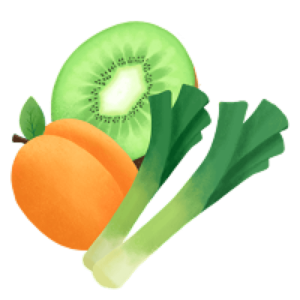 | Include at least one different fruit or vegetable in every meal Variety is just as important as quantity! |
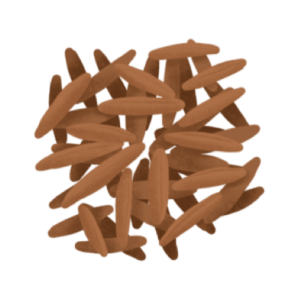 | Choose whole grains over refined ones They are richer in fiber and better for your microbiota. |
 | Incorporate legumes into your meals Add them to your menus at least twice a week. |
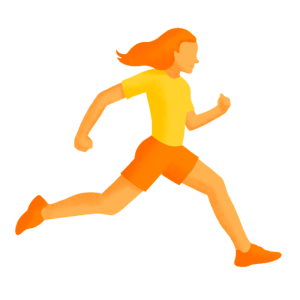 | Stay active! Even 10-15 minutes several times a day can make a difference. |
 | Take care of your sleep Go to bed at regular times, aim for 7 to 9 hours of sleep per night, and limit screen use in the evening, stopping at least an hour before bedtime. |
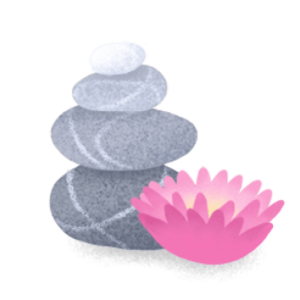 | Prioritize mental well-being If you work in front of a screen, take 5-minute breaks every hour. Dedicate at least 10 minutes a day to meditation or deep breathing exercises. |
- ¹ Sender R, Fuchs S, Milo R. Revised Estimates for the Number of Human and Bacteria Cells in the Body. PLoS Biol. 2016 Aug 19;14(8):e1002533. doi: 10.1371/journal.pbio.1002533. PMID: 27541692; PMCID: PMC4991899.
- ² Qin, J., Li, R., Raes, J. et al. A human gut microbial gene catalogue established by metagenomic sequencing. Nature 464, 59–65 (2010). https://doi.org/10.1038/nature08821
- ³ ARTE (Producteur). (2019, octobre 19). Microbiote, les fabuleux pouvoirs du ventre [Vidéo]. YouTube. https://www.youtube.com/watch?v=zp0X1ga9MzY
- ⁴ Narula N, Wong ECL, Dehghan M, Mente A, Rangarajan S, Lanas F, Lopez-Jaramillo P, Rohatgi P, Lakshmi PVM, Varma RP, Orlandini A, Avezum A, Wielgosz A, Poirier P, Almadi MA, Altuntas Y, Ng KK, Chifamba J, Yeates K, Puoane T, Khatib R, Yusuf R, Boström KB, Zatonska K, Iqbal R, Weida L, Yibing Z, Sidong L, Dans A, Yusufali A, Mohammadifard N, Marshall JK, Moayyedi P, Reinisch W, Yusuf S. Association of ultra-processed food intake with risk of inflammatory bowel disease: prospective cohort study. BMJ. 2021 Jul 14;374:n1554. doi: 10.1136/bmj.n1554. PMID: 34261638; PMCID: PMC8279036.
- ⁵ Sircana A, Framarin L, Leone N, Berrutti M, Castellino F, Parente R, De Michieli F, Paschetta E, Musso G. Altered Gut Microbiota in Type 2 Diabetes: Just a Coincidence? Curr Diab Rep. 2018 Sep 13;18(10):98. doi: 10.1007/s11892-018-1057-6. PMID: 30215149.
- ⁶ Wilkins AT, Reimer RA. Obesity, Early Life Gut Microbiota, and Antibiotics. Microorganisms. 2021 Feb 17;9(2):413. doi: 10.3390/microorganisms9020413. PMID: 33671180; PMCID: PMC7922584.
- ⁷ Tang WH, Wang Z, Levison BS, Koeth RA, Britt EB, Fu X, Wu Y, Hazen SL. Intestinal microbial metabolism of phosphatidylcholine and cardiovascular risk. N Engl J Med. 2013 Apr 25;368(17):1575-84. doi: 10.1056/NEJMoa1109400. PMID: 23614584; PMCID: PMC3701945.
- ⁸ Taniya MA, Chung HJ, Al Mamun A, Alam S, Aziz MA, Emon NU, Islam MM, Hong SS, Podder BR, Ara Mimi A, Aktar Suchi S, Xiao J. Role of Gut Microbiome in Autism Spectrum Disorder and Its Therapeutic Regulation. Front Cell Infect Microbiol. 2022 Jul 22;12:915701. doi: 10.3389/fcimb.2022.915701. PMID: 35937689; PMCID: PMC9355470.
- ⁹ Kennedy, K.M., Gerlach, M.J., Adam, T. et al. Fetal meconium does not have a detectable microbiota before birth. Nat Microbiol 6, 865–873 (2021). https://doi.org/10.1038/s41564-021-00904-0
- ¹⁰ Inés Martínez, Maria X Maldonado-Gomez, João Carlos Gomes-Neto, Hatem Kittana, Hua Ding, Robert Schmaltz, Payal Joglekar, Roberto Jiménez Cardona, Nathan L Marsteller, Steven W Kembel, Andrew K Benson, Daniel A Peterson, Amanda E Ramer-Tait, Jens Walter (2018) Experimental evaluation of the importance of colonization history in early-life gut microbiota assembly eLife
- ¹¹ Stewart, C.J., Ajami, N.J., O’Brien, J.L. et al. Temporal development of the gut microbiome in early childhood from the TEDDY study. Nature 562, 583–588 (2018). https://doi.org/10.1038/s41586-018-0617-x
- ¹² Rothschild D, Weissbrod O, Barkan E, Kurilshikov A, Korem T, Zeevi D, Costea PI, Godneva A, Kalka IN, Bar N, Shilo S, Lador D, Vila AV, Zmora N, Pevsner-Fischer M, Israeli D, Kosower N, Malka G, Wolf BC, Avnit-Sagi T, Lotan-Pompan M, Weinberger A, Halpern Z, Carmi S, Fu J, Wijmenga C, Zhernakova A, Elinav E, Segal E. Environment dominates over host genetics in shaping human gut microbiota. Nature. 2018 Mar 8;555(7695):210-215. doi: 10.1038/nature25973. Epub 2018 Feb 28. PMID: 29489753.
- ¹³ David, L., Maurice, C., Carmody, R. et al. Diet rapidly and reproducibly alters the human gut microbiome. Nature 505, 559–563 (2014). https://doi.org/10.1038/nature12820
- ¹⁴ Rowland I, Gibson G, Heinken A, Scott K, Swann J, Thiele I, Tuohy K. Gut microbiota functions: metabolism of nutrients and other food components. Eur J Nutr. 2018 Feb;57(1):1-24. doi: 10.1007/s00394-017-1445-8. Epub 2017 Apr 9. PMID: 28393285; PMCID: PMC5847071.
- ¹⁵ LeBlanc JG, Chain F, Martín R, Bermúdez-Humarán LG, Courau S, Langella P. Beneficial effects on host energy metabolism of short-chain fatty acids and vitamins produced by commensal and probiotic bacteria. Microb Cell Fact. 2017 May 8;16(1):79. doi: 10.1186/s12934-017-0691-z. PMID: 28482838; PMCID: PMC5423028.
- ¹⁶ FRANCE 5. Corpus : Au cœur des organes. Le microbiote intestinal. YouTube, 20 June 2019, www.youtube.com/watch?v=42UgTEpRIpc.
- ¹⁷ Yang, Qiang, et al. “Decoding Immune Interactions of Gut Microbiota for Understanding the Mechanisms of Diseases and Treatment.” Frontiers in Microbiology, vol. 14, 2023, Article 1238822, https://doi.org/10.3389/fmicb.2023.1238822.
- ¹⁸ Ridaura VK, Faith JJ, Rey FE, Cheng J, Duncan AE, Kau AL, Griffin NW, Lombard V, Henrissat B, Bain JR, Muehlbauer MJ, Ilkayeva O, Semenkovich CF, Funai K, Hayashi DK, Lyle BJ, Martini MC, Ursell LK, Clemente JC, Van Treuren W, Walters WA, Knight R, Newgard CB, Heath AC, Gordon JI. Gut microbiota from twins discordant for obesity modulate metabolism in mice. Science. 2013 Sep 6;341(6150):1241214. doi: 10.1126/science.1241214. PMID: 24009397; PMCID: PMC3829625.
- ¹⁹ Nathalie Vergnolle, directrice de recherche Inserm - “Le microbiote, un deuxième cerveau…vraiment? Institut de Recherche en Santé Digestive
- ²⁰ Marano G, Mazza M, Lisci FM, Ciliberto M, Traversi G, Kotzalidis GD, De Berardis D, Laterza L, Sani G, Gasbarrini A, Gaetani E. The Microbiota-Gut-Brain Axis: Psychoneuroimmunological Insights. Nutrients. 2023 Mar 20;15(6):1496. doi: 10.3390/nu15061496. PMID: 36986226; PMCID: PMC10059722.
- ²¹ Sasso JM et coll. Gut microbiome-brain alliance: A landscape view into mental and gastrointestinal health and disorders. ACS Chem Neurosci 2023;14(10):1717-1763.
- ²² Radjabzadeh, D., Bosch, J.A., Uitterlinden, A.G. et al. Gut microbiome-wide association study of depressive symptoms. Nat Commun 13, 7128 (2022). https://doi.org/10.1038/s41467-022-34502-3
- ²³ Appleton J. The Gut-Brain Axis: Influence of Microbiota on Mood and Mental Health. Integr Med (Encinitas). 2018 Aug;17(4):28-32. PMID: 31043907; PMCID: PMC6469458.
- ²⁴ World Health Organization. "WHO Updates Guidelines on Fats and Carbohydrates." World Health Organization, 17 July 2023, https://www.who.int/news/item/17-07-2023-who-updates-guidelines-on-fats-and-carbohydrates.
- ²⁵ Anses (2017), Étude individuelle nationale des consommations alimentaires 3 (INCA 3).
- ²⁶ Quagliani D, Felt-Gunderson P. Closing America's Fiber Intake Gap: Communication Strategies From a Food and Fiber Summit. Am J Lifestyle Med. 2016 Jul 7;11(1):80-85. doi: 10.1177/1559827615588079. PMID: 30202317; PMCID: PMC6124841.
- ²⁷ Reynolds A, Mann J, Cummings J, Winter N, Mete E, Te Morenga L. Carbohydrate quality and human health: a series of systematic reviews and meta-analyses. Lancet. 2019 Feb 2;393(10170):434-445. doi: 10.1016/S0140-6736(18)31809-9. Epub 2019 Jan 10. Erratum in: Lancet. 2019 Feb 2;393(10170):406. doi: 10.1016/S0140-6736(19)30119-9. PMID: 30638909.
- ²⁸ Monash University. (2020). Prebiotic diet - FAQs. Department of Gastroenterology. Retrieved from https://www.monash.edu/medicine/translational/gastroenterology/prebiotic/faq
- ²⁹ Recommandations relatives à l’alimentation, à l’activité physique et à la sédentarité pour les adultes. Saint-Maurice : Santé publique France, 2019. 61 p. https://www.santepubliquefrance. fr/determinants-de-sante/nutrition-et-activite-physique/documents/rapport-synthese/ recommandations-relatives-a-l-alimentation-a-l-activite-physique-et-a-la-sedentarite-pour-lesadultes
- ³⁰ Topping, David L. and Peter M. Clifton. “Short-chain fatty acids and human colonic function: roles of resistant starch and nonstarch polysaccharides.” Physiological reviews 81 3 (2001): 1031-64 .
- ³¹ Singh, R. K., Chang, H. W., Yan, D., Lee, K. M., Ucmak, D., Wong, K., Abrouk, M., Farahnik, B., Nakamura, M., Zhu, T. H., Bhutani, T., & Liao, W. (2017). Influence of diet on the gut microbiome and implications for human health. In Journal of Translational Medicine (Vol. 15, Issue 1). BioMed Central Ltd. https://doi.org/10.1186/s12967-017-1175-y
- ³² Rana A, Samtiya M, Dhewa T, Mishra V, Aluko RE. Health benefits of polyphenols: A concise review. J Food Biochem. 2022 Oct;46(10):e14264. doi: 10.1111/jfbc.14264. Epub 2022 Jun 13. PMID: 35694805.
- ³³ Cory, H., Passarelli, S., Szeto, J., Tamez, M., & Mattei, J. (2018). The role of polyphenols in human health and food systems: A mini-review. Frontiers in nutrition, 5, 370438.
- ³⁴ Barański M, Srednicka-Tober D, Volakakis N, Seal C, Sanderson R, Stewart GB, Benbrook C, Biavati B, Markellou E, Giotis C, Gromadzka-Ostrowska J, Rembiałkowska E, Skwarło-Sońta K, Tahvonen R, Janovská D, Niggli U, Nicot P, Leifert C. Higher antioxidant and lower cadmium concentrations and lower incidence of pesticide residues in organically grown crops: a systematic literature review and meta-analyses. Br J Nutr. 2014 Sep 14;112(5):794-811. doi: 10.1017/S0007114514001366. Epub 2014 Jun 26. PMID: 24968103; PMCID: PMC4141693.
- ³⁵ Coelho, M.C.; Malcata, F.X.; Silva, C.C.G. Lactic Acid Bacteria in Raw-Milk Cheeses: From Starter Cultures to Probiotic Functions. Foods 2022, 11, 2276. https://doi.org/10.3390/foods11152276
- ³⁶ Rizzoli, R., Biver, E. Role of fermented dairy products in the health benefits of a mediterranean diet. Aging Clin Exp Res 36, 75 (2024). https://doi.org/10.1007/s40520-024-02721-x
- ³⁷ Anissa M. Armet, Edward C. Deehan, Aidan F. O’Sullivan, João F. Mota, Catherine J. Field, Carla M. Prado, Alice J. Lucey, Jens Walter,Rethinking healthy eating in light of the gut microbiome, Cell Host & Microbe, Volume 30, Issue 6, 2022, Pages 764-785, ISSN 1931-3128, https://doi.org/10.1016/j.chom.2022.04.016.
- ³⁸ Wastyk HC, Fragiadakis GK, Perelman D, Dahan D, Merrill BD, Yu FB, Topf M, Gonzalez CG, Van Treuren W, Han S, Robinson JL, Elias JE, Sonnenburg ED, Gardner CD, Sonnenburg JL. Gut-microbiota-targeted diets modulate human immune status. Cell. 2021 Aug 5;184(16):4137-4153.e14. doi: 10.1016/j.cell.2021.06.019. Epub 2021 Jul 12. PMID: 34256014; PMCID: PMC9020749.
- ³⁹ Tanzo, Julia et al. Association of Acid-Suppressive Medication and Antimicrobial Use in Infancy with Food Allergy and Anaphylaxis, Journal of Allergy and Clinical Immunology, Volume 153, Issue 2, AB260 (2024)
- ⁴⁰ Bailey LC, Forrest CB, Zhang P, Richards TM, Livshits A, DeRusso PA. Association of antibiotics in infancy with early childhood obesity. JAMA Pediatr. 2014 Nov;168(11):1063-9. doi: 10.1001/jamapediatrics.2014.1539. PMID: 25265089.
- ⁴¹ Kronman MP, Zaoutis TE, Haynes K, Feng R, Coffin SE. Antibiotic exposure and IBD development among children: a population-based cohort study. Pediatrics. 2012 Oct;130(4):e794-803. doi: 10.1542/peds.2011-3886. Epub 2012 Sep 24. PMID: 23008454; PMCID: PMC4074626.
- ⁴² Cheng WY, Wu C, Yu J The role of gut microbiota in cancer treatment: friend or foe?Gut 2020;69:1867-1876.
- ⁴³ Chassaing, B., Koren, O., Goodrich, J. et al. Dietary emulsifiers impact the mouse gut microbiota promoting colitis and metabolic syndrome. Nature 519, 92–96 (2015). https://doi.org/10.1038/nature14232
- ⁴⁴ Naimi, S., Viennois, E., Gewirtz, A.T. et al. Direct impact of commonly used dietary emulsifiers on human gut microbiota. Microbiome 9, 66 (2021). https://doi.org/10.1186/s40168-020-00996-6
- ⁴⁵ Suez, J., Korem, T., Zeevi, D. et al. Artificial sweeteners induce glucose intolerance by altering the gut microbiota. Nature 514, 181–186 (2014). https://doi.org/10.1038/nature13793
- ⁴⁶ Ali Noorafshan, Maedeh Hashemi, Saied Karbalay-Doust, Fatemeh Karimi, High dose Allura Red, rather than the ADI dose, induces structural and behavioral changes in the medial prefrontal cortex of rats and taurine can protect it, Acta Histochemica, Volume 120, Issue 6, 2018, Pages 586-594, https://doi.org/10.1016/j.acthis.2018.07.004.
- ⁴⁷ Whelan, K., Bancil, A.S., Lindsay, J.O. et al. Ultra-processed foods and food additives in gut health and disease. Nat Rev Gastroenterol Hepatol 21, 406–427 (2024). https://doi.org/10.1038/s41575-024-00893-5
- ⁴⁸ Csáki, K. F. (2011). Synthetic surfactant food additives can cause intestinal barrier dysfunction. Medical hypotheses, 76(5), 676-681.
- ⁴⁹ Lerner, A., & Matthias, T. (2015). Changes in intestinal tight junction permeability associated with industrial food additives explain the rising incidence of autoimmune disease. Autoimmunity reviews, 14(6), 479-489.
- ⁵⁰ Antush, M.T.; Balemba, O.B.; Hendricks, S.A.; Flynn, M.; Geidl, R.; Vella, C.A. Associations of Sedentary Behavior and Screen Time with Human Gut Microbiome Composition and Diversity. Life 2024, 14, 363. https://doi.org/10.3390/life14030363
- ⁵¹ Monda, Vincenzo, Villano, Ines, Messina, Antonietta, Valenzano, Anna, Esposito, Teresa, Moscatelli, Fiorenzo, Viggiano, Andrea, Cibelli, Giuseppe, Chieffi, Sergio, Monda, Marcellino, Messina, Giovanni, Exercise Modifies the Gut Microbiota with Positive Health Effects, Oxidative Medicine and Cellular Longevity, 2017, 3831972, 8 pages, 2017. https://doi.org/10.1155/2017/3831972
- ⁵² Mohr AE, Jäger R, Carpenter KC, Kerksick CM, Purpura M, Townsend JR, West NP, Black K, Gleeson M, Pyne DB, Wells SD, Arent SM, Kreider RB, Campbell BI, Bannock L, Scheiman J, Wissent CJ, Pane M, Kalman DS, Pugh JN, Ortega-Santos CP, Ter Haar JA, Arciero PJ, Antonio J. The athletic gut microbiota. J Int Soc Sports Nutr. 2020 May 12;17(1):24. doi: 10.1186/s12970-020-00353-w. PMID: 32398103; PMCID: PMC7218537.
- ⁵³ Dohnalová L, Lundgren P, Carty JRE, Goldstein N, Wenski SL, Nanudorn P, Thiengmag S, Huang KP, Litichevskiy L, Descamps HC, Chellappa K, Glassman A, Kessler S, Kim J, Cox TO, Dmitrieva-Posocco O, Wong AC, Allman EL, Ghosh S, Sharma N, Sengupta K, Cornes B, Dean N, Churchill GA, Khurana TS, Sellmyer MA, FitzGerald GA, Patterson AD, Baur JA, Alhadeff AL, Helfrich EJN, Levy M, Betley JN, Thaiss CA. A microbiome-dependent gut-brain pathway regulates motivation for exercise. Nature. 2022 Dec;612(7941):739-747. doi: 10.1038/s41586-022-05525-z. Epub 2022 Dec 14. PMID: 36517598; PMCID: PMC11162758.
- ⁵⁴ Clauss M, Gérard P, Mosca A, Leclerc M. Interplay Between Exercise and Gut Microbiome in the Context of Human Health and Performance. Front Nutr. 2021 Jun 10;8:637010. doi: 10.3389/fnut.2021.637010. PMID: 34179053; PMCID: PMC8222532.
- ⁵⁵ Madison A, Kiecolt-Glaser JK. Stress, depression, diet, and the gut microbiota: human-bacteria interactions at the core of psychoneuroimmunology and nutrition. Curr Opin Behav Sci. 2019 Aug;28:105-110. doi: 10.1016/j.cobeha.2019.01.011. Epub 2019 Mar 25. PMID: 32395568; PMCID: PMC7213601.
- ⁵⁶ Yatsunenko T, Rey FE, Manary MJ, Trehan I, Dominguez-Bello MG, Contreras M, Magris M, Hidalgo G, Baldassano RN, Anokhin AP, Heath AC, Warner B, Reeder J, Kuczynski J, Caporaso JG, Lozupone CA, Lauber C, Clemente JC, Knights D, Knight R, Gordon JI. Human gut microbiome viewed across age and geography. Nature. 2012 May 9;486(7402):222-7. doi: 10.1038/nature11053. PMID: 22699611; PMCID: PMC3376388.
- ⁵⁷ Bermingham KM, Stensrud S, Asnicar F, Valdes AM, Franks PW, Wolf J, Hadjigeorgiou G, Davies R, Spector TD, Segata N, Berry SE, Hall WL. Exploring the relationship between social jetlag with gut microbial composition, diet and cardiometabolic health, in the ZOE PREDICT 1 cohort. Eur J Nutr. 2023 Dec;62(8):3135-3147. doi: 10.1007/s00394-023-03204-x. Epub 2023 Aug 2. PMID: 37528259; PMCID: PMC10611873.







Would touch allow me to use your app in store to allow my customers to scan and search their products?
Very interesting article. Reiterates how important our gut is. Thank you.
Have occasional lapses so a reminder is good.
Simple elegance — best explanation of how important gut health is and how to defend it — your life depends on it.
At 71 years young, I have never been healthier as my JERF diet (just eat real food) serves me well. I grow much of my food and buy what I have to — most without an ingredients label. And yes, food prep takes up much of my day but I would rather spend time taking care of myself rather than in medical offices suffering with sickness.
I am mentoring a 24 year old lady who is suffering from H. pylori and just completed a 10 day round of 3 antibiotics. She is slowly learning how important it is to learn how to cook (avoid industrial factory foods and packages with warning labels/ingredient labels that have chemicals you don’t find in a home kitchen), eat out rarely, and manage stress with exercise and a healthy sleep schedule.
Thanks for these excellent articles and the Yuka app.
Thank you, this is very helpful. Some things I knew, but a refresher is always good. There are some areas I need to do better in and that was very helpful. Thank you for explaining this in a way that’s easy to understand and for putting all the time I and work into helping others.
Very interesting and informative, I knew a lot of it but it crystallises my next moves.
Thank you for explaining and sharing this information clearly. When things are explained like this it is easy to take action and invest in our own health. The connection between gut health and mental health is so interesting and important to understand, thank you for making this clear. Thank you for the scientific explanation next to the practical solutions of getting our diet and health right. So appreciate of this information.
Very good and helpful. I was in the ER almost a week ago and found out I have colitis, a lower intestine infection as a result of 2 weeks of antibiotics. Article is just what I need to get my gut healthy and stay healthy.
thank you for this very beneficial information
Excellent article, very well formed and easy to understand.
Excellent app. with very informative info. provided. Printed reviews and articles are also useful and not too complex to take in!
This is a FANTASTIC article & information!! Thank you very much!! I really appreciate & value YUKA
Thanks for this information! Its a perfect reminder to maintain my health (when caught up in my daily life) and get back on track for my wellbeing.
Thank you! You are a blessing 😊
easy to read and ‘digest’, excellent article thank you
Great reading, soo informative. Thanks for everthing Yuca!!!
Great information and Yuka is a valuable resource. My friend turned me on to it and simply eating healthy I have lost a lot of weight and have had positive doctor visits. Great article by the way and thank you all at Yuka for helping so many lives.
Thank you.
This is But Jesus!!! This is awesome information for us to be blessed with. I’m new to Yuka it’s been truly a blessing to me and my family and I’m even telling my friends about Yuka. God has blessed the Yuka staff and team and thanks for being a blessing to us all. Please keep doing what you’re because you are changing lives one day at a time. Thanks to Everyone!!!
Just excellent! Thank you!
Since scanning all my hair products and using products that get a 100% rating, I am now experiencing very minimal hair loss when shampooing. I am so happy!
Keep up the good work.
Blessings
Excellent information presented in an easily digestible (groan) way. Love the app – think I’ve scanned 2 million plus bar codes by now
Absolutely love Yuka.. I am a newbie to this app,s I am still reading and learning, but so far have found several interesting/ helpful links to guide my food choices. Thanks to all of the ones behind the creation of the app.
Possible future client 🤔
Excellent advice thanks for the tips makes life a lot easier to choose the right foods
Very good information I love it
Very informative and well laid out with good explanation and useful tips. Thanks.
Very Thorough ! Nice long piece of information Thankyou , surprised it didnt include a list of germ foods …
Great information to keep in mind daily, when we plan our meals …thank you 👍
Very interesting article.
Great article, will share with patients, friends and family. Great explanations of how to keep a healthy microbiota. Love the App, Thank you
Thanks for the reminder to keep healthy
Love the information and the Yuka App! I regularly refer the app to friends and acquaintances!!
Bravo! Excellent présentation. Merci
Clear explanation and very useful article, thanks very much for this information.
Really good read thankyou
Thank you so much for this easy to follow info
Such interesting articles and written in a fabulous way to understand more.
I’m never bored reading these and strive to take the important info onboard.
Many thanks
What a comprehensive and readable article! Such a useful thing for everyone to read and learn about!
This is informative.I will definitely be doing drastic changes to my lifestyle. Thanks and peace be.
Excellent article. I have been trying to implement the changes mentioned and so far have been able to reverse my type 2 diabetes but still working on gut bacteria. Thank you very much.
Excellent article. I have been trying to implement the he changes mentioned and do far have been able to reverse my type 2 diabetes but still working on hut bacteria. Thank you very much.
Really enjoyed reading this article. Thank you 👍
Excellent thank you!
very interesting good to know
Really interesting article. Enjoyed reading it and very informative. Looking forward to the next one.
Excellent article.
Beautifully explained, thorough article.
Very interesting really enjoyed reading this article thank you
An excellent summary of what’s good and not so good for us – I love my YUKA APP couldn’t live without it now Thank You All at YUKA x
Such an interesting and informative read, thank you! Love the app and the articles you publish. They make it so much easier to cut through the noise make healthier decisions day to day, I really appreciate it.
Love using your app when shopping, had reduced the time I have to read and debate which item is best for us.
Zoe project changed my view 3 years ago so dramatically. Reviewing so many aspects of what I thought I was doing well. Yuka has taken that to another easy to use level. Thank you
Ps I hope you and Zoe project are talking about collaboration….. strikes me as a ‘no brainer”
Excellent article, very informative and useful, please keep writing more, we really appreciate it, thank you!!
A very interesting and comprehensive article. I note your stress about limiting antibiotic use, but should you not emphasise that, if prescribed a course, it must be completed otherwise it educates the surviving bad bacteria on becoming immune to the antibiotic and thus risking spread of any particular infections/disease!
Very interesting and informative. Thank you Yuka.
Thank you very much for very informative information. Easy and very clear to understand. Thanks again.
I changed alot in my life style and my food since, I download your app.
Many thanks
Brilliant, thanks so much for information, puts everything in its place to understand clearly.
Very informative information. Well written and easy to understand.
Very informative and clear guidance, with the right amount of detail. Interesting to read and to have nearby to refer to.
Use your app frequently. Thank you Yuka!
Brilliant read thanks for this great information.
Brilliant information. I’ve been a vegan for 32 years. I don’t buy processed food. I have qualifications in vegan and vegetarian nutrition, and yet………when I use your superb App I still see the mistakes I can make in supermarkets. Well done yuka, thank you.
Thank you for the information, interesting read.
Really informative
Invaluable app and article. I obsessively YUKA all products before buying ( yep, the crazy lady!) and am constantly shocked by products I thought were healthy ( alternatively by products I thought weren’t). Thanks a million! Great work!
Excelente thank you
Thankyou for this great info on gut health!
Would you recommend any probiotic supplements for a few months to help with this. I ve been looking at Bettervits!
Thank you for sharing this powerful information I have learnt a lot.
Very informative.
Another great and informative article. Thank you
Thank you! Really informative!
Wow! A fascinating read. I have to keep going over it and trying to digest as much as I can. I have made a start to change although I didn’t think my diet too bad till I read your article. Thank you. So here goes??
Many thanks for this valuable information and the excellent tips at the end of the article.
Thank you for the important and valuable information.
Thank you, it’s great to know we can always rely on Yuka to look after our well being and guidance on good health 👍
Thank you Yuka
Very enlightening- thankyou. Guess I knew about most of it but it really helps to be reminded & reinforce good eating & activities.
I always look forward to your informative newsletters and I love the App. Yuka has made it easy for me to go in to the supermarket and just go for the healthier options. Thanks Yuka.
Great information, anything like this to remind us of the importance of being healthy is great reading!!! Thank you 😊
Very good reading as this info makes sense here. I do most of this anyway but the ones I have missed out I will rectify thank you.
Thank you
Thanks guys. That’s a very great piece 👏.
Very interesting and informative.
Thank you, very interesting and informative.
A great article and very informative
Thank you. A really informative piece.
Great article, very interesting, thanks.
A lot of information that I already knew here, but presented in the most comprehensive and clear format that I have come across. I will be sharing the article and spreading the message. Thank you
Great information here.It really gives you a nudge if you have been indulging too much e.g Easter.Thank you.
A very comprehensive report and well written. It’s so informative with clear guidance. It’s well referenced as well. Shared with my extensive family! Thank you
So interesting, thank you for making this read easy to digest as well as being very informative.
Thanks Yuka your Brilliant.
Dear all,
Thank you for such excellent information regarding one’s health,since I’ve always looked for healthy options in life,the App has been excellent in choosing products whether it’s food or fruit and skincare that are better for the body inside and out.
Kind regards
Giuseppe
After reading the comments there is very little l can add, except for carry on the good work Yuka.
Excellent piece, thanks.
A fabulous article that is easy to read and understand.
Thank you so much for sharing!
Thanks. Really enjoyed this article
Fantastic informative article.
I have enjoyed reading this & learning lots more about this subject.
I am inspired to put what I have learned into action.
Thankyou
A very interesting read . Thankyou
Great article ! And should become a gov priority over profit 😎👏😎
Very informative read. I would like to print the wheel poster and keep it in.my kitchen as a daily reminder. Brilliant article. Thank you.
Very accessible and illuminating article. Really enjoyed reading this and it covered a huge amount in very simple steps. Thank you for sharing this .
I really enjoyed your article very informative and interesting to know . You are doing a great job thank you.
Very helpful and informative article. Good to read and easy to understand.
Thank you Yuka
Very interesting and informative, keep up the great work.
Very interesting and informative article. Many thanks, Yuka.
Excellent article- a confusing subject simplified- thank you Yuka- I depend on you more and more!
Yuka has changed me and my family’s life. Excellent. I continually spread the word.
I take most of these item .since using your app. Which I use when shopping And I’m still going strong at 77
Really interesting & helpful article. Thank you Yuka.
Loved reading this article. So informative and useful. Carry on informing us! I am always trying to improve my diet especially for my microbiome!
Fabulous to see this on a app at last so helpful.
Great! A concise and easy to understand article in how to stay fit and healthy! Thank you 🍎
Thank you once again for your clear and helpful advice
Great advice and very informative – will endeavour to improve my diet – thank you for an excellent article.
Informative and easy to follow.
Thank you 😊
An excellent read , love Yuma.
This is so very helpful. Thank you for taking the time to write and share this with me.
Good solid advice – very helpful
This is excellent! Thank you
Very informative thankyou for this very important advice
Gail Pert
Very informative and useful. I do follow most of the advice in the article, I am proud to say
Nirmala
Excellent. Yuka is excellent all round.
An excellent reminder
Excellent, many thanks, we try to follow a good and varied diet and all your information helps.
Very informative! Thankyou
Thanks for this very interesting article i enjoyed everything about it and it will help keep me on the right track to looking after my microbiota
Very interesting reading, I use the YUKA app to spot check the right foods to eat and not to eat which relates to the article. I brought a turbo-trainer for my bike and use it daily for exercise
I have a aged problem of random faecal incontinence. I have found that eating vegetables and fruit as you recommend exacerbates my bowl problem, so a ‘one size fits all cure’ isn’t always the complete answer. In my case, fibre can be an enemy rather than a friend.
Super interesting article! Probiotics can also make an impact in our microbiota.
Thank you so much. This article is so interesting and informative.
Great and very informative, I’ve just come off antibiotics which I have not used in 15 years and I am trying to get as much good bacteria into my body .
Fabulous informative article, thank you very much
Love Yuka – always informative and interesting
Great article very informative nice work
Very interesting and helpful gives a good understanding
Thank you for an easy, interesting and informative read. It will help me improve my gut health and I will certainly share with others.🙏
I found that interesting, I’m glad I’m dolots of things right…healthy eating etc, I’ve started to make a lot of things from scratch and try not to have processed food. I’m even making my own face cream from tallow, so all in all I think I’m not doing too bad. 🙃
Excellent, thank you.
Fantastic! Really helpful and easy to take in.. Great graphics. I’m 82 and I thought In knew it all, but I didn’t, so it’s never too late to learn.
Thankyou !
This information has helped me understand a lot more which I didn’t k ow about my body and foods that are good for me. I will certainly be taking it on board and be changing a lot about what i eat and dont eat. Very helpful, thank you.
Very easy article to understand and absorb. I think Tim Spector, who’s a British epidemiologist and the founder of Zoe has been studying this subject for a quite some time, its program is aimed at the individual; as you have mentioned, rather than lumping everyone together. Apparently, even twins were found to have different dietary requirements due to differences in Microbiota behaviour.
Very interesting reading, I have benefited and learned quite a lot and will try to improve my lifestyle
Excellent article. Very clear and well structured. Thank you.
We are incredibly designed. Thank you for a very interesting and informative article.
Very interesting and informative.
Great…
What a fabulous, informative article! Thank you.
Excellent,
Thank you for sharing. I enjoyed reading every word it all made sense to me. Unfortunately I am taking antibiotics for a chest infection. I buy organic meat veg and fruit .
When you need to take antibiotics, an hour or so after each dose take acidophilus 👍🏼
I agree with it all and I do most of it already but my dictionary says different for my ibs and acid reflux
I find this easy to understand, useful and informative. Thank you
Great article, good for thought, thank you!
verry good infromation to change life style thank you yuka!
Very good ,informative article . Thanks
Thanks for this very clear explanation. The sadness is that my grandmother, who left school at 12, knew all of the lifestyle info. Maybe she didn’t know why, scientifically, but for her generation eating and living healthy was normal.
Very interesting article. Well presented and pact full of information. It reinforced what I am doing right with my diet, but every day is a school day and I learnt a lot too! Thank you
Very interesting article, extremely clear and well presented. Thank you
I’m saving this article. Interesting and very informative. Also easy to read and ‘digest’
Thank you.
Excellent!
Thank you! I love Yuka and all the life-saving tips! Shared with many and will continue to do so 🙏🏼
Really useful information and interesting. Thank you so much.
thanks so much for the updates and information
It’s a really well written and complete article , brilliant summary
Great article, well done.
Thank you so much for all this beneficiary information. Really good to know all of it.
Excellent article reminding us that there is not just one aspect to take care of but to rather adopt a holistic approach.
Very interesting reading, clear and well presented. Thank you
any thoughts on alcohol?
or supplements; and drugs other than antibiotics?
do you recommend probiotic beverages compared with the foods mentioned?
Good advice, many thanks.
Thank you so much, fascinating and extremely useful.
Love this article, extremely informative. However the price when buying organic can be high especially if I’m aiming to consume more.
Congratulations on a superbly explained article. Better than some of the books I have read. We all need to be reminded from time to time.
Thank you.
Very informative, most of which I already know but now need to put into practice 😀 Thank you
Thank you that was very interesting
Thank you for sharing
Great information and very clearly written – thank you
This is such a great article perfectly articulated and layed out thankyou so much. Although I’m aware of my gut bacteria and try and stay healthy it’s really great to be reminded and have it all layed out in front of you. Everyone should see this I will definately pass it on..
Every morning I use an oil pulling technique with coconut oil to clean my gums and teeth. Would this have an adverse effect at all? Thanks for article, really informative.
I found all the information very helpful, even thou I knew most of it, it was good to be reminded and the various explanation was very interesting
Thank you, brilliant advice, many notes taken
Really interesting subject
Just the right length of information
Brilliant information thank you
Most useful.. thank you sincerely.
Thank you for sharing
Really good information, I’ve passed it round to family and friends. Thanks
Every morning I use an oil pulling technique with coconut oil to clean my gums and teeth. Would this have an adverse effect at all? Thanks for article, really informative.
Love this article 👏
A great, comprehensive but still accessible study. The graphics serve as an aide-memoire.
Brilliant article 👌Super in-formative…
Thankyou
I’ve recently discovered date syrup, which is just pureed dates, and am now using it as a substitute for sugar, golden syrup, honey, maple syrup etc. Am I kidding myself by thinking this must be a bit healthier?
Well worth reading!
Thank you for sharing.
Great read thanks for sharing this information.
Really enjoy your artciles and also the fact they are ever now and again rather than evry week!
What a great piece of information, thank you.
Read through it and took note of things to eat and be aware of.
Fab thanks.
A great, comprehensive but still accessible study. The graphics serve as an addiaude-memoire.
Very well written with simple language and bullet points. Fascinating and helpful
A very helpful reminder to us all. Thank you
Great article, to give insight to the importance of our body’s requirements, to stay healthy, in this chemical laden planet, man has produced.
Thank you, that’s a really interesting read.
Awesome read and knowledgeable information shared. Thanks for providing such pivotal insights into one’s ecosystem. I will make further changes to my diet moving forward.
Thank you for interesting information
A very good article. Thank you for sharing!
Such a wonderful, helpful article – thank you
Thank you. Helpful reminder, as well as new informations, we learn every day. Look forward to more articles.
Thank you, very good read, helpful reminder, as well as new informations, we learn every day. Look forward to more articles.
Fabulous article! Thank you!!!
Very Interesting and informative read.